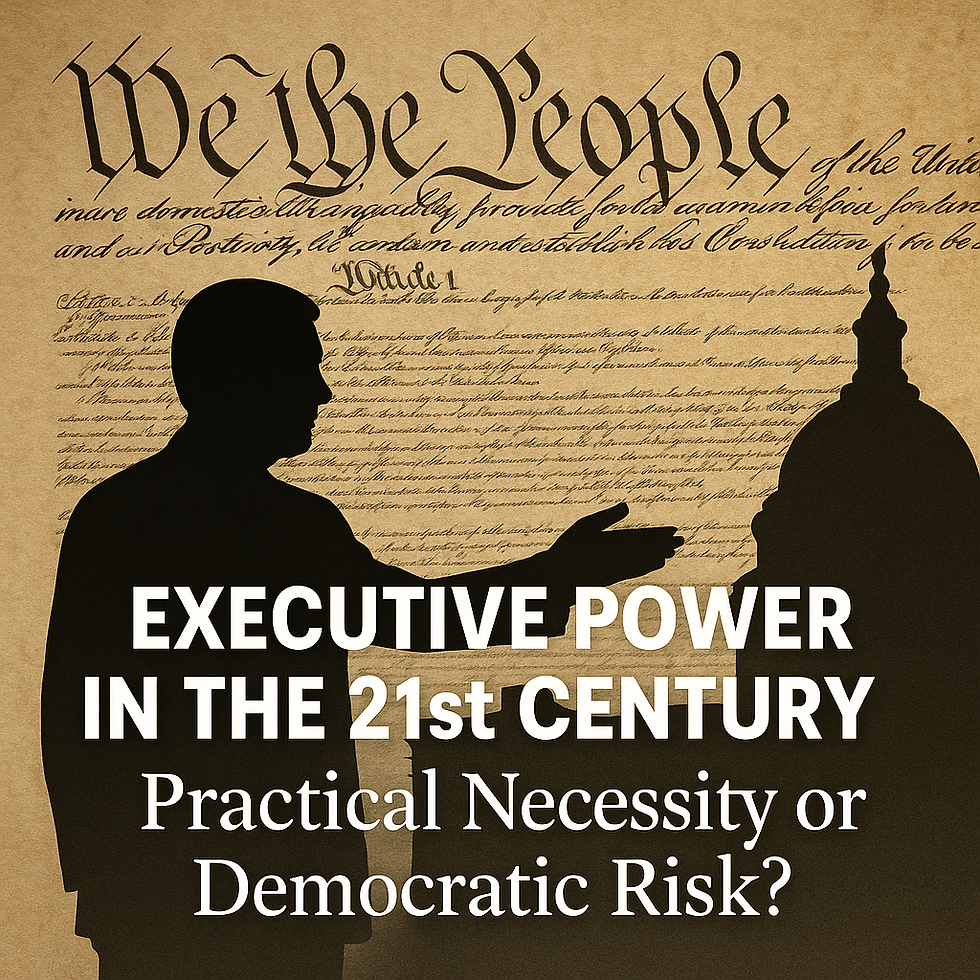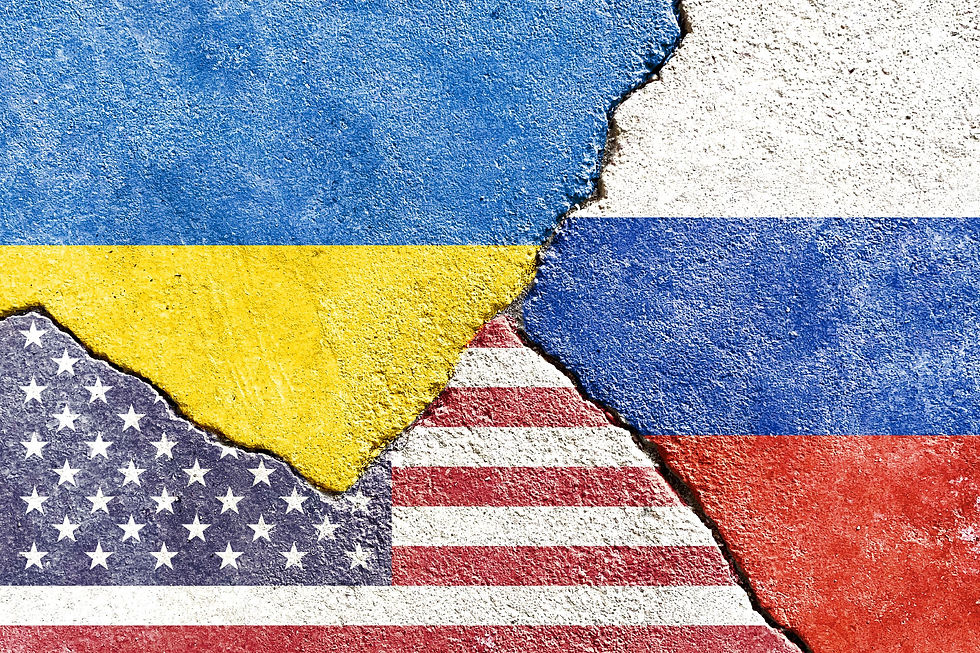A New Geopolitical Landscape: Plausible Outcomes and Implications of the Ukraine-Russia War
- Dr. Johnson -UnTangled Talk

- Jan 12, 2024
- 5 min read

The current Ukraine-Russia conflict has entered a critical stage, in which, some would argue, the two states have reached a stalemate. With such, the prospects for potential peace negotiations would move the conflict into a post-conflict era. This, in essence, can be seen as the conflict being at an important crossroads that could redefine geopolitical relationships and international law in relation to post-conflict plausible scenarios we may be faced with. Moreover, the prospect of Ukraine ceding territories occupied by Russia under any peaceful agreement raises complicated questions about the future of international relations and the rule of international law, as well as regional power dynamics. This discussion post explores this multifaceted issue, delving into the potential after-effects of such a deal, its impact on Ukraine, Russia, and the EU, as well as the global order.
It would be fair to state that a new reality for Ukraine & Russia would be derived from any prospect that an actual peace agreement is signed by the two warring parties. Notably, it could be argued that, at this point, agreements between Ukraine and Russia will involve Ukraine ceding territories to Russia. The ceding of territories to Russia would signal a significant shift in regional geopolitics for any future plausible discussion on a post-conflict scenario. As of today, we see that although Ukraine, with the support of Western weapons, has slowed Russia, this does not ultimately mean a victory. Notably, when considering a recent article published by the Center for Strategic & International Studies, we find that,
"There is currently no way to predict when and how the war between Russia and Ukraine—which has become a proxy war involving the U.S. and its strategic partners – will end. Ukraine has not sustained its counteroffensives against Russia and has made some gains in the recent fighting. More importantly, Ukraine has not recovered most of the territory it lost in 2022, and Putin’s Russia is conducting a major military build-up. The result is that Ukraine now faces a bitter war of attrition against steadily growing Russian forces, facing ongoing missile and air attacks on Ukraine’s military and civilian infrastructure as Russia seeks to win through superior mass. Over-optimistic rhetoric aside, the United States and its strategic partners recognize this. They are rushing to try to provide the right kind of military and financial support Ukraine needs to survive and have any chance of pushing Russian forces and occupiers out of Eastern Ukraine” (Cordesman, A. (2023). Center for Strategic & International Studies: How? (and Does?) the War in Ukraine End: The Need for a Grand Strategy. Retrieved from https://www.csis.org/analysis/how-and-does-war-ukraine-end-need-grand-strategy.).
This scenario, although it could end hostilities in the region, raises questions about the future of both countries. First, ceding land under a peaceful agreement would be a significant breach of Ukraine's sovereignty and violate International Law. While, on the other hand, this concession could be seen as necessary for peace; however, it could also cause internal political and socio-economic upheaval that we still do not fully understand when considering the international future-geopolitical conversation.
Ultimately, the Ukrainian Government, following any peace agreement with Russia, would have to maintain its national unity and resilience as well as justify the territorial loss before its citizens. A plausible scenario narrative, for example, the Ukrainian President, could be one of adopting a focus on the larger part of the state by framing it as a decision to safeguard the future of the nation. On the other hand, Russia may spin its lack of achieved objectives by considering any territorial gains a success. This outcome may strengthen the narrative in Russia about Russian strength and resilience to Western opposition. It might also reinforce President Putin's position as a leader. Even with a reinforced Putin, the regional influence the state of Russia once had would be diminished by its lack of a decisive win over Ukraine.
Furthermore, when considering any plausible future scenario in which Ukraine and Russia agree to peace or a cease in hostilities, it could be argued that the response of the international communities, especially Western nations, would be critical to how future conflict and world affairs unfold. There could also be a case made for isolating Russia from the Western world, in which the United States is seen as leading, or a case can be made for re-engaging post-conflict Russia back into international affairs/community. I would remind readers of this discussion post and argue at the same time that Russia is a nuclear power and, as such, still possesses the ability to impact global security and garner attention on any geopolitical approach or stage it acts. With the latter being said, in my opinion, dealing with a scenario in which the West attempts to isolate Russia would be a terrible geopolitical strategy and could lead to even more Russian aggression.
Moreover, when considering how the Ukraine-Russia conflict has prompted European countries to reevaluate their security strategies, we know it has led to increased defense expenditures and a renewed dedication to NATO and its own energy security needs. On the other hand, we have a Russia that has decided to align itself with countries such as China and Iran in response to Western sanctions and current political isolation. It could be argued that following any post-conflict scenario, the West may find that Russia’s new alliances may provide strategic partnerships outside the Western block, but they do not necessarily translate to the same level of dominance Russia previously had, in which Russia was seen, arguably, more of an international/geopolitical state player. In all, it could be argued that a post-conflict scenario could paradoxically result in a Russia that is larger on a territorial scale but more isolated with less influence in regional and world affairs.
Lastly, I would argue that any plausible scenario in which a post-conflict era arises would put the geopolitical situation in Eastern Europe at a crossroads. Notably, in light of the containment policy outlined in Foreign Affairs by Liana Fix and Michael Kimmage, it's clear that a post-conflict world would not mean an outright win for either side but rather a complicated realignment. Ukraine, despite its potential territorial losses, may emerge as a symbol that it is resilient, having successfully contained a military superior adversary, with the aid of Western allies. Russia may achieve an ‘in theory’ triumph by gaining territorial gains at the price of economic and political isolation and a diminished influence in regional and international affairs. In my opinion, this new reality shows the importance of the West having a realistic strategy, not only in the military realm but also in the diplomatic, economic, and political. The lessons learned in this conflict will help the world navigate this new geopolitical context and shape the future of statecraft and international order.
Please share your thoughts and leave a comment!
Relevant References:
Cordesman, A. (2023). Center for Strategic & International Studies: How? (and Does?) the War
in Ukraine End: The Need for a Grand Strategy. Retrieved from https://www.csis.org/analysis/how-and-does-war-ukraine-end-need-grand-strategy.
Fix, L., & Kimmage, M. (2023). Foreign Affairs: A Containment Strategy for Ukraine. Retrieved



Great insights into a delicate and extremely complicated geopolitical conflict. I couldn’t agree more that isolation would not be prudent and a more measured approach would be far better.